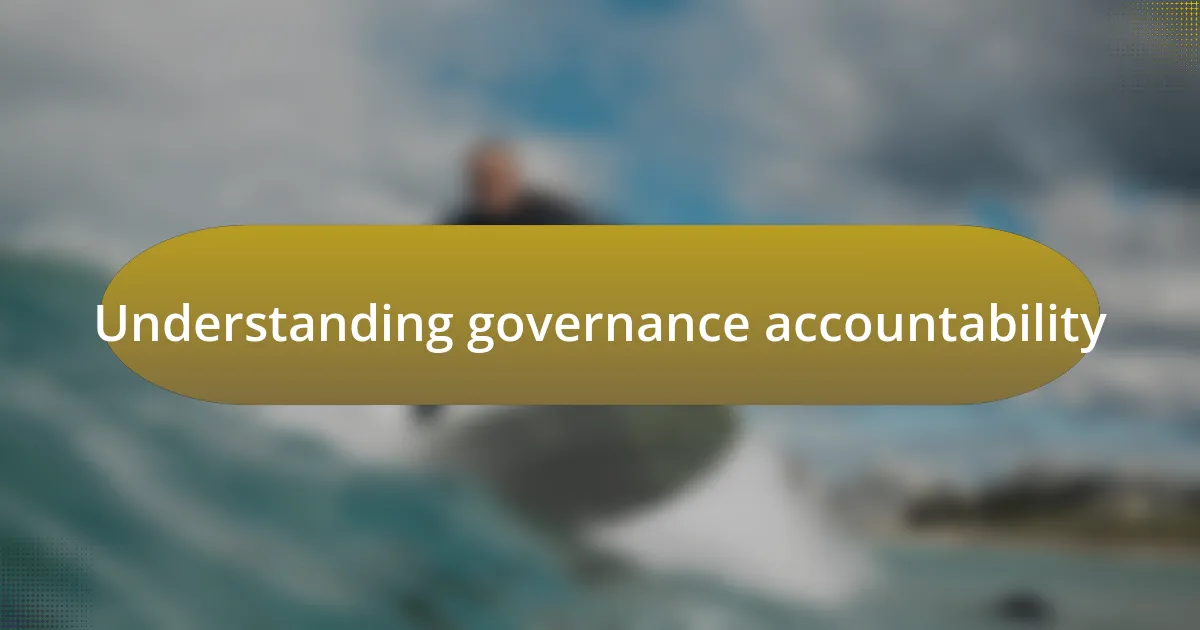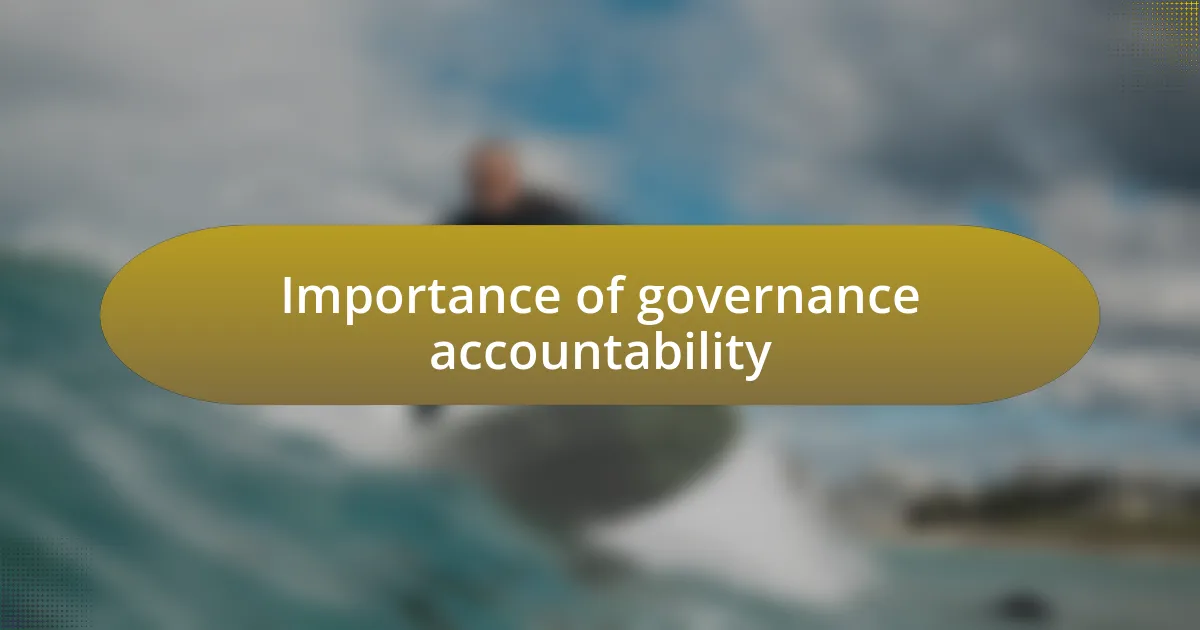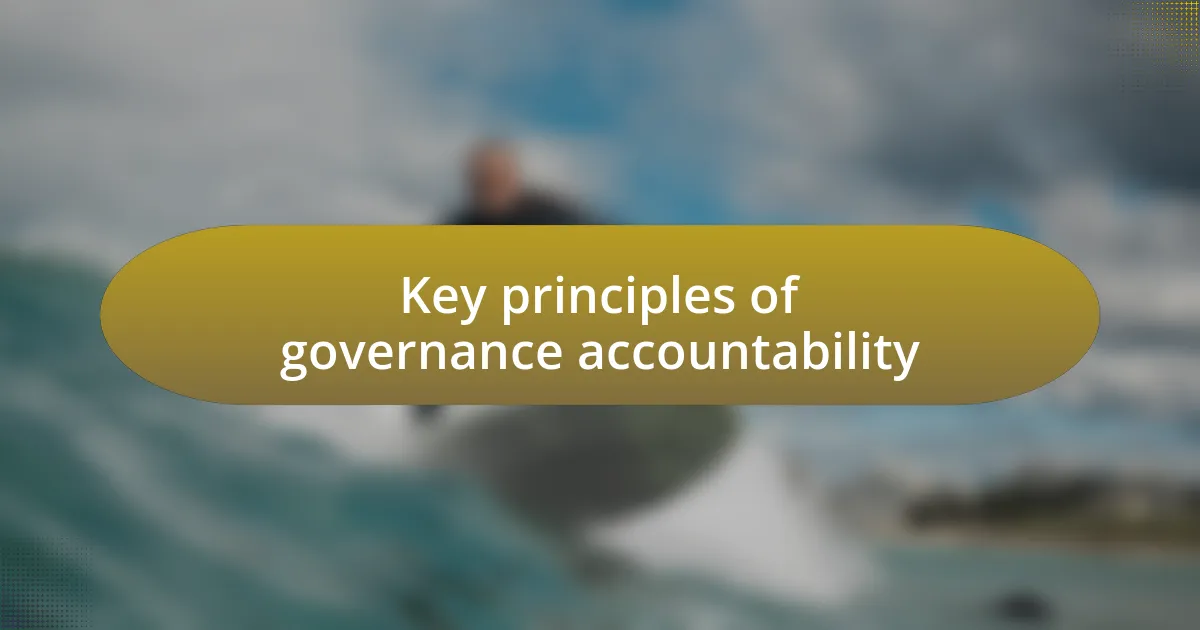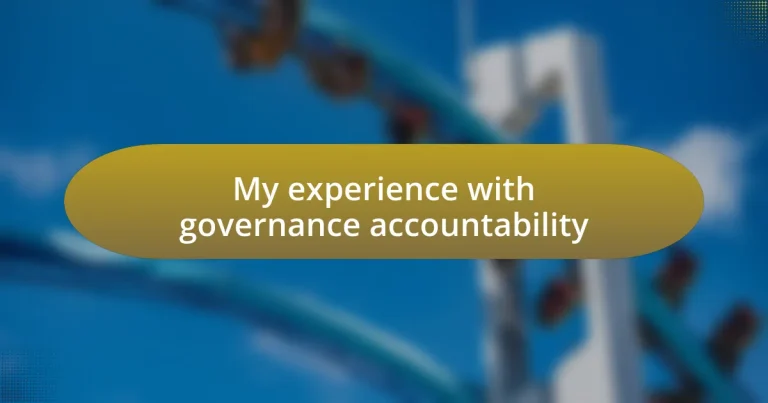Key takeaways:
- Governance accountability fosters trust and community engagement, enabling collective problem-solving through transparency and open communication.
- Key principles of accountability include transparency, responsibility, answerability, participation, and integrity, all essential for effective governance.
- Challenges such as resistance to change, unclear roles, and complex governance structures can hinder accountability efforts.
- Implementing strategies like clear role definition, training, and recognizing contributions can significantly enhance accountability practices within organizations.

Understanding governance accountability
Governance accountability is foundational to building trust within any organization or community. From my experience working on local governance initiatives, I often found that when decision-makers were transparent about their actions, it fostered a strong sense of ownership among community members. Think about it: how can we expect people to engage if they don’t feel their voices matter or if they feel decisions are made behind closed doors?
In a particular project I was part of, we implemented regular feedback sessions, which opened up discussions about community expectations. It was remarkable to see how sharing our challenges led to collective problem-solving. Have you ever noticed how a sense of involvement can spark deeper engagement? I learned that accountability isn’t just about answering for past actions; it’s also about creating pathways for future collaboration.
When governance bodies demonstrate accountability, they allow the community to hold them responsible for their commitments. I remember a time when we published our performance reports, and it was both nerve-wracking and liberating. Sharing honest assessments invited critique but also showed our commitment to improvement. Isn’t it empowering when we know we can hold each other accountable, thereby reinforcing a culture of trust and integrity?

Importance of governance accountability
In my journey through governance initiatives, I’ve realized that accountability acts as a catalyst for effective decision-making. When leaders are held accountable, it creates an environment where everyone takes their role seriously. I recall a time when we had to confront some disappointing results. The accountability we established encouraged an honest dialogue, leading us to rethink our strategies and truly engage stakeholders in the process.
There’s no underestimating the power of accountability in fostering public trust. One instance that stands out for me was when our team faced scrutiny after a controversial decision. Instead of shying away, we embraced the accountability framework and organized community forums to address concerns directly. This openness transformed resistance into collaboration, illustrating that people are more likely to support initiatives when they feel involved in the decision-making process.
Moreover, implementing governance accountability doesn’t just bring scrutiny; it also cultivates resilience. In another project, we faced unexpected challenges due to a lack of resources. Instead of concealing it, we acknowledged the shortfall publicly and sought community input on potential solutions. This honesty not only boosted our credibility but also empowered individuals to contribute ideas, forging a stronger partnership between governance and the community.
| Aspect | Traditional Governance | Governance with Accountability |
|---|---|---|
| Trust Level | Low | High |
| Community Involvement | Passive | Active |
| Decision-making | Top-down | Collaborative |
| Transparency | Limited | Comprehensive |

Key principles of governance accountability
Key principles of governance accountability are foundational to establishing trust and transparency. One principle that resonates deeply with me is transparency itself. Back when I was involved in a policy overhaul, sharing every step of the process with stakeholders made a huge difference. Their continuous feedback shaped our decisions, creating a sense of ownership that I hadn’t anticipated. This experience reinforced my belief that when information flows freely, it builds rapport and encourages participation.
Here are some critical principles that I see as vital to effective governance accountability:
- Transparency: Open access to information allows stakeholders to understand processes and decisions.
- Responsibility: Leaders and officials must take ownership of their decisions and outcomes, both good and bad.
- Answerability: Institutions should be willing to explain their actions and respond to stakeholders’ concerns.
- Participation: Involving citizens in decision-making fosters collaboration and a sense of belonging.
- Integrity: Upholding ethical standards ensures that governance is conducted fairly and justly.

Challenges faced in governance accountability
One major challenge I’ve encountered in governance accountability is the resistance to change, especially within established systems. I remember a committee meeting where we proposed new accountability measures to enhance transparency, but many members were hesitant. It made me wonder, why do we cling to outdated practices that diminish trust? This reluctance can stifle progress and hinder the implementation of more effective governance.
Another significant hurdle is the lack of clarity in roles and responsibilities. In one project, confusion over who was accountable for specific outcomes led to blame-shifting during a critical phase. It was frustrating to witness. When individuals aren’t certain of their responsibilities, accountability gets lost in the shuffle, leaving stakeholders feeling disillusioned and disengaged.
Lastly, the complexity of governance structures often complicates accountability. I’ve seen initiatives fail simply because the lines of authority were convoluted. It raises an essential question: how can we hold anyone accountable when the organizational chart resembles a tangled web? Simplifying these structures can empower individuals and promote a more straightforward approach to accountability.

Strategies for improving governance accountability
One effective strategy I’ve found to improve governance accountability is fostering a culture of open communication. I recall a situation where a simple feedback mechanism transformed our team’s dynamic. Encouraging honest conversations made it easier to address concerns, and suddenly, everyone felt more connected and invested in the process. Isn’t it remarkable how transparency can enhance trust and collaboration?
Another approach involves clearly defining roles and expectations. In my experience, when we took the time to outline each member’s responsibilities during a project kickoff, we saw a significant drop in misunderstandings. It was as if a fog had lifted. How can we expect accountability if no one knows what they’re accountable for? Clarity empowers individuals and nurtures ownership, leading to more robust accountability practices.
Training and development are also key components. I remember when our organization implemented workshops on governance accountability—those sessions really opened my eyes. The growth in knowledge and skills among my colleagues was palpable, and it inspired a greater commitment to accountability. Doesn’t it make sense that when people feel equipped and informed, they’ll be more likely to take responsibility for their actions?

Lessons learned from my experience
One significant lesson I learned is the power of accountability in decision-making. I once participated in a project where we hesitated to make tough choices, fearing pushback from higher-ups. Eventually, we realized that owning our decisions—not just their outcomes—allowed us to work more confidently and innovatively. Have you ever experienced the weight of hesitation? It’s liberating to embrace responsibility, and I found that it fosters creativity and strengthens team bonds.
Another insight is the importance of resilience in governance accountability. I remember a time when a strategic initiative didn’t go as planned, and the team faced considerable criticism. Rather than shying away from responsibility, we held a debrief to analyze what went wrong and how we could improve. That experience taught me that setbacks are valuable lessons, not just obstacles. How often do we overlook the potential growth hidden in failure?
Lastly, I discovered that celebrating small wins can be transformative. In one of our projects, we made it a point to recognize individual contributions, no matter how minor. This practice shifted our focus from merely meeting goals to appreciating the efforts along the way. I still recall the positive energy that spread throughout the team—something as simple as acknowledgment can profoundly motivate. Isn’t it interesting how a culture of recognition can drive greater accountability?

